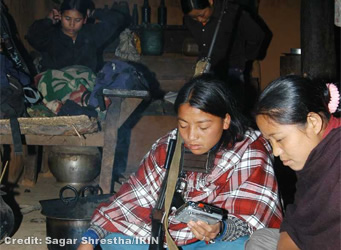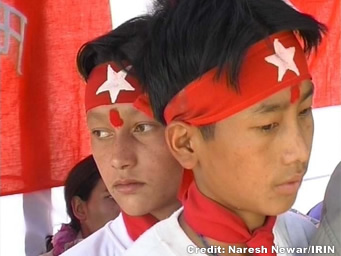|
 |
Child
soldiers in Nepal |
|
|
|
Rights
activists demand rehabilitation of child soldiers
|
 |
KATHMANDU,
15 Aug 2006 (IRIN)
Rights
groups are concerned that peace talks to end Nepal's decade-long conflict
have ignored the disarming and rehabilitation of child soldiers.
Tarak
Dhital, of the local NGO Child Workers in Nepal (CWIN), said the demilitarisation,
demobilisation and reintegration(DDR) of child soldiers had to be given
top priority.
"This
issue has not been raised in any of the peace talks yet," Dhital said.
Maoists
rebels and government forces stopped fighting in April after a mass uprising
led by the country's seven parties forced King Gyanendra to end direct
rule. The rebels and interim government have been in peace talks since
May.
But
activists are frustrated that both sides have ignored implementing a DDR
process for children.
"The
saddest part is that they fail to realise that children have been most
heavily affected and used in the armed conflict," Dhital said.
 |
| Child
supporters of the Maoists - many are kidnapped or coerced into serving
with the rebels
Activists
said while there was no accurate data on the number of child soldiers and
support workers used by either side, there was enough evidence to suggest
there were many hundreds.
"I
fled from the Maoists after they abducted me to work as a cook for their
military group," a 17-year-old girl from Rukum District, 500 km northwest
of the capital, Kathmandu, said.
A
large number of children were abducted and forced to work for the Maoists,
she said. |
|
The
United Nations Children's Fund (UNICEF) defines a child soldier as any
person under 18 years old who is "part of any kind of regular or irregular
armed force or group in any capacity, including but not limited to cooks,
porters, messengers and those accompanying such groups, other than purely
as family members. It does not, therefore, only refer to a child who is
carrying or has carried arms."
Children
were used in all the above roles with appalling consequences, CWIN said.
Several who worked as porters, cooks or musicians had disappeared after
their arrest and illegal detention by security forces.
Watchlist
on Children and Armed conflict, an international watchdog, said children
who were used as informers by government forces had been tortured by the
Maoists. It said that up to 30 percent of Maoist forces were children.
Insec,
a prominent Nepalese human rights group, said Maoists and government forces
had been responsible for the killing of a large number of children, many
of whom were under 15 years old. It estimated 346 had been killed between
February 1996 and June 2006.
 |
| Young female Maoists seeking refuge in a poor farmer's house. The family
feels uncomfortable about their presence - they fear the reaction of the
security forces if they find out that the family has sheltered rebels.Child
supporters of the Maoists - many are kidnapped or coerced into serving
with the rebels
Meanwhile,
Nepalese NGOs have formed a network, 'Children Associated With Armed Forces
and Groups', to work on a youth DDR process. A number of transit homes
for former child soldiers were also being set up to provide temporary refuge,
vocational training and counselling.
The
UN's office in Nepal was also working with child protection agencies to
prepare an action plan for returning children and those affected by the
conflict, to their families, UNICEF said. |
|
Rosanna
Vega, a UNICEF child protection officer in Nepal, said early intervention
was critical for the normal development of children employed in the conflict,
even with the peace process.
"If
you don't act now, it could be too late," Vega said.
Activists
were planning to strongly lobby for a child-DDR process.
"For
a start, we need both sides to make a public appeal that they would begin
the process and ensure safe return and provisions, including free education,
for these children," Bhola Dahal, an expert from Save the Children (Norway),
said.
Credit
IRIN 2006
Copyright
© UN Office for the Coordination of Humanitarian Affairs 2006
[
This report does not necessarily reflect the views of the United Nations]
Integrated
Regional Information Networks (IRIN), part of the UN Office for the Coordination
of Humanitarian Affairs (OCHA). |
 |
| Links |
 |
 |
 |
External
links |
|





